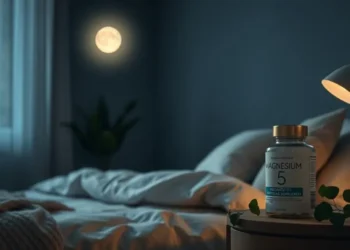Suppose you find yourself experiencing extreme mood swings, ranging from episodes of euphoria and high energy to periods of deep sadness and depression. In that case, you may be wondering if you could have bipolar disorder. Bipolar disorder is a mental health condition characterized by these shifts in mood, as well as changes in activity levels and the ability to carry out daily tasks.
In this article, we will explore the signs and symptoms of bipolar disorder, as well as the process of diagnosing this condition. By understanding these aspects, you can gain insights into whether you may be affected by bipolar disorder and take appropriate steps to seek help and support.
Table of Contents
Key Takeaways:
- Extreme mood swings and changes in activity levels characterize bipolar disorder.
- Recognizing the signs and symptoms of bipolar disorder is the first step toward diagnosis and treatment.
- Seeking professional help is crucial for an accurate diagnosis and appropriate management of bipolar disorder.
- Self-assessment tools can provide a starting point for discussions with healthcare professionals.
- Understanding bipolar disorder can help individuals receive a proper diagnosis and develop an effective treatment plan.
Recognizing Bipolar Disorder Symptoms
If you suspect that you or a loved one may be experiencing bipolar disorder, it’s essential to recognize the signs and symptoms associated with this condition. Knowing these symptoms can help you better understand your experiences and facilitate more informed discussions with healthcare professionals.
Bipolar disorder symptoms can vary in intensity and duration, but they generally fall into two categories: manic episodes and depressive episodes. During manic episodes, individuals may experience heightened energy levels, euphoria, increased talkativeness, and a decreased need for sleep.
They may engage in impulsive or risky behaviors, such as excessive spending or reckless driving. On the other hand, during depressive episodes, individuals may feel persistent sadness, hopelessness, and a loss of interest or pleasure in activities they once enjoyed. They may experience changes in appetite, sleep disturbances, and difficulty concentrating or making decisions.
It’s important to note that the symptoms of bipolar disorder can manifest differently in each person, and not everyone will experience all the symptoms. Some individuals may primarily experience manic episodes, while others may mainly experience depressive episodes. Additionally, there may be periods of stability between episodes where symptoms are less noticeable or absent, making it essential to track and monitor changes in mood and behavior over time.
Recognizing signs of bipolar disorder is crucial for seeking appropriate treatment and support. If you notice persistent and recurring patterns of extreme mood swings that significantly impact daily functioning and relationships, it may be indicative of bipolar disorder. It is recommended to consult with a healthcare professional for a comprehensive evaluation and diagnosis.
The Diagnostic Process
In the diagnosis of bipolar disorder, healthcare professionals employ various methods and techniques to assess a patient’s symptoms and make an accurate determination. This section will delve into the diagnostic process, including screening tests and assessments that aid in identifying bipolar disorder.
One of the primary approaches to bipolar disorder diagnosis is through a comprehensive evaluation of the patient’s symptoms and medical history. This assessment allows healthcare professionals to gather information about the individual’s experiences and identify any patterns indicative of bipolar disorder.
Additionally, a physical examination may be conducted to rule out any other underlying medical conditions or substances that could contribute to the symptoms.
Beyond the initial evaluation, screening tests are crucial in the diagnostic process. These tests are designed to assess the presence and severity of bipolar disorder symptoms. They can include questionnaires, structured interviews, or self-report assessments that help evaluate mood disturbances, changes in activity levels, and other behavioral indicators commonly associated with bipolar disorder.
A widely used screening tool for bipolar disorder is the Mood Disorder Questionnaire (MDQ). This self-report questionnaire consists of a series of specific questions related to mood swings, irritability, and other symptoms associated with bipolar disorder.
The MDQ helps individuals and healthcare professionals identify the presence of bipolar disorder symptoms and determine the need for further evaluation.
It is important to note that while screening tests can provide valuable insights, they are not definitive in diagnosing bipolar disorder. A proper diagnosis requires a comprehensive evaluation by a qualified healthcare professional, such as a psychiatrist or psychologist. These experts will carefully analyze the patient’s symptoms, medical history, and the results of any screening tests to make an accurate diagnosis.
Overall, the diagnostic process for bipolar disorder involves a combination of assessments, evaluations, and screening tests. By utilizing these methods, healthcare professionals can accurately diagnose bipolar disorder and develop an appropriate treatment plan tailored to the individual’s needs.
For comprehensive and reliable results, it is crucial to consult with a healthcare professional if you suspect you may have bipolar disorder. Seeking professional help ensures that all necessary evaluations and tests are conducted to confirm the diagnosis and provide appropriate care.
Self-Assessment for Bipolar Disorder

Self-assessment can be a valuable tool for understanding mental health. Self-reflection and evaluation can give helpful insights into your symptoms and experiences. This information can be a starting point for conversations with healthcare professionals.
One effective method of self-assessment for bipolar disorder is through the use of quizzes specifically designed to evaluate the presence of symptoms associated with the condition. Completing these quizzes can help you gauge the likelihood of having bipolar disorder and provide a basis for further discussion with your doctor or mental health specialist.
It’s important to note that self-assessment quizzes should not be relied upon as a definitive diagnosis. Instead, they serve as a helpful initial step in understanding your mental health. They can help you recognize potential indicators of bipolar disorder and guide you in seeking appropriate professional guidance.
A self-assessment quiz can be a useful tool in raising self-awareness and starting a conversation about your mental health. It can help you recognize patterns and symptoms that may align with bipolar disorder and prompt you to seek professional help. Remember, it’s always important to consult a healthcare professional for a proper diagnosis and treatment plan.
Example Self-Assessment Question:
Below is an example of a question you may encounter in a bipolar disorder self-assessment quiz:
- Have you experienced periods of excessively high energy, racing thoughts, and an inflated sense of self-importance?
- Yes
- No
| Question | Response |
|---|---|
| Have you experienced periods of excessively high energy, racing thoughts, and an inflated sense of self-importance? | Yes |
Answering questions like this honestly and introspectively can help you better understand your experiences and support the diagnostic process when working with healthcare professionals. Remember, self-assessment begins the journey toward accurate diagnosis and appropriate treatment.
Seeking Professional Help
If you suspect that you may have bipolar disorder based on the signs and symptoms you have been experiencing, it is essential to seek professional help. Consulting with a healthcare professional can provide guidance and support for an accurate diagnosis and appropriate management.
A comprehensive evaluation by a healthcare professional is crucial in determining whether you have bipolar disorder. They will assess your symptoms and medical history and conduct tests to rule out other possible causes. By seeking a professional diagnosis, you can receive the guidance and treatment you need for your specific condition.
It is important not to self-diagnose and rely solely on online information or personal opinions to determine if you have bipolar disorder. Only a qualified healthcare professional can provide a proper diagnosis based on their expertise and knowledge.
Being open and honest about your experiences and symptoms is essential during your consultation. This will enable the healthcare professional to gather all the necessary information to diagnose accurately. Remember, they are there to help you, and confidentiality is vital in maintaining trust and privacy.
Once diagnosed with bipolar disorder, your healthcare professional will work with you to develop an appropriate management plan. This plan may involve a combination of medication, therapy, and lifestyle changes to help you effectively manage your symptoms and improve your overall well-being.
Support Networks
Living with bipolar disorder can be challenging, but you don’t have to face it alone. In addition to seeking professional help, connecting with support networks can provide valuable assistance and understanding. Support groups, therapy groups, and online communities offer a platform to share experiences, gain insights, and access useful resources.
Remember, your diagnosis does not define you. With the proper support, guidance, and treatment, you can lead a fulfilling life and effectively manage your bipolar disorder.
| Signs of Bipolar Disorder | Bipolar Disorder Diagnosis |
|---|---|
| – Extreme mood swings – Intense periods of euphoria or irritability – Increased energy levels – Impulsive behavior – Decreased need for sleep – Racing thoughts – Difficulty concentrating | – Comprehensive evaluation by a healthcare professional – Assessment of symptoms and medical history – Ruling out other possible causes – Diagnostic tests – Open and honest communication – Development of a management plan |
Conclusion
In conclusion, understanding the signs and symptoms of bipolar disorder is crucial in determining whether you may be suffering from this condition. By recognizing these symptoms and seeking professional help, you can receive a proper diagnosis and develop an appropriate treatment plan.
FAQ
How can I tell if I am suffering from bipolar disorder?
Bipolar disorder is characterized by significant mood swings, ranging from periods of intense energy and elevated mood (mania) to periods of extreme sadness and hopelessness (depression). Some common symptoms include changes in sleep patterns, increased activity or restlessness, irritability, difficulty concentrating, and impulsivity. It is essential to consult with a healthcare professional for a proper diagnosis.
What are the symptoms of bipolar disorder?
The symptoms of bipolar disorder can vary but commonly include periods of mania or hypomania, characterized by elevated mood, increased energy, racing thoughts, and impulsive behavior. These manic episodes are typically followed by periods of depression, marked by feelings of sadness, hopelessness, fatigue, and loss of interest in previously enjoyed activities. It is essential to consult with a medical professional to determine if these symptoms align with bipolar disorder.
How is bipolar disorder diagnosed?
The process of diagnosing bipolar disorder involves a comprehensive assessment, which includes discussing your symptoms and medical history with a healthcare professional. They may also utilize screening tests, interviews, and observation of symptoms over time to determine if you meet the criteria for bipolar disorder. Consulting with a qualified healthcare professional for an accurate diagnosis is crucial.
How can I perform a self-assessment for bipolar disorder?
There are self-assessment tools available that can help you evaluate your symptoms and experiences related to bipolar disorder. These tools often include questions about your mood, behavior, and thoughts. While these self-assessments can provide insights, they should not replace a professional diagnosis. If you suspect you may have bipolar disorder, it is essential to consult with a healthcare professional for a comprehensive evaluation.
Why is seeking professional help necessary for bipolar disorder?
Seeking professional help is crucial if you suspect you may have bipolar disorder. A qualified healthcare professional can comprehensively evaluate your medical history, symptoms, and duration. They can diagnose accurately and develop an appropriate treatment plan to manage your symptoms effectively. It is always recommended to consult with a healthcare professional for proper guidance and support.










